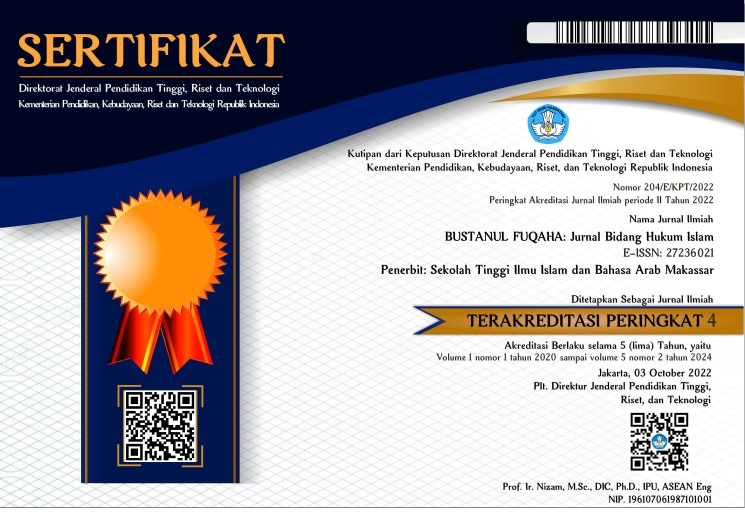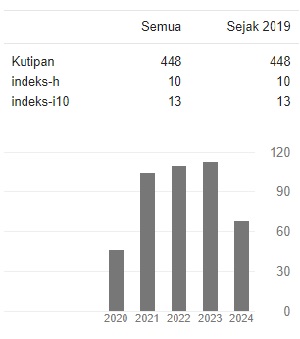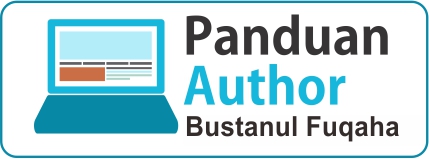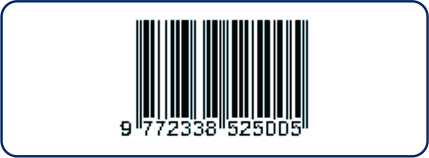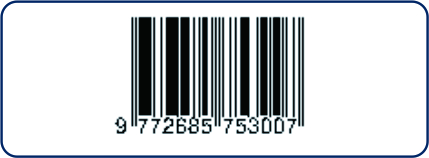Penyaluran Zakat untuk Penanganan Dampak Covid-19 dalam Perspektif Hukum Islam (Analisis Pendapat Para Ulama Fikih)
Zakat Distribution for Handling the Impact of Covid-19 in Islamic Law Perspective (Analysis of Opinions of Fiqh Scholars)
DOI:
https://doi.org/10.36701/bustanul.v3i3.661Keywords:
zakat, Covid-19, Islamic Law, ulamaAbstract
This study aims to determine the law of distributing zakat in the prevention of Covid-19 based on the perspective of Islamic law. This research is a type of qualitative research that focuses on the study of texts (library research) with a normative and historical approach. The results of the study show that the law for distributing zakat is in tackling or handling the impact of Covid-19, such as the allocation of consumptive zakat on the procurement of basic needs, medicines, Personal Protective Equipment (PPE) clothing for medical personnel, disinfectants needed by officers or volunteers, and others, are mubah (permissible). This law of permissibility is based on the study of the verses of the Qur'an, hadith and the opinions of scholars. However, this permit still has to prioritize the poor in meeting their basic needs in the form of zakat distribution, both in cash and in kind.
Downloads
References
Amanda, Gebrina Rizki, Fatatun Malihah, Sulistiani Indriyastuti, Nur Khumairah, Tulasmi Tulasmi, dan Titania Mukti. “Pendayagunaan Zakat Pada Masa Pandemi Covid-19”, Jurnal Ilmiah Ekonomi Islam 7, no. 1 (2021): 216-222.
Badan Amil Zakat Nasional (BAZNAS), “Baznaz Targetgan Pengumpulan Zakat Nasional 2022 Rp 26 Triliun”, Situs Resmi Baznas. https://baznas.go.id/Press_Release/baca/BAZNAS_Targetkan_Pengumpulan_Zakat_Nasional_2022_Rp_26_Triliun/954 (5 Juni 2022).
Darmawan, Awang, dan Rina Desiana. “Zakat dan Pemerataan Ekonomi di Masa Pandemi Covid-19”, Al-Azhar Journal of Islamic Economics 3, no. 1 (2021): 12-21.
Fathoni, Abdurrahmat, Metodologi Penelitian & Teknik Penyusunan Skripsi, Jakarta : Rineka Cipta, 2011.
al-Fauzān, Sālih Ibn Fauzān Ibn Abdillāh, al-Mulakhkhash al-Fiqh, Jilid I, Cet. I; Riyadh: Dār al-‘Ashimah, 1423 H.
Infeksi Emerging Kementerian Kesehatan R.I., “Situasi Terkini Perkembangan Coronavirus Disease (Covid-19)”, Situs Resmi Infeksi Emerging. https://infeksiemerging.kemkes.go.id/situasi-infeksi-emerging/situasi-terkini-perkembangan-coronavirus-disease-Covid-19-28-mei-2022 (5 Juni 2022).
al-Juzairi, ‘Abdurrahmān, al-Fiqh Alā al-Mażāhib al-Arba’ah, Cet II; Beirut: Dār al-Kutub al-‘Ilmiyyah, 2003 M.
Kartikasari, Elsi, Pengantar Hukum Zakat dan Wakaf, Cet.I; Jakarta: PT. Grasindo, 2007.
Majelis Ulama Indonesia, Fatwa Tentang Pendayagunaan Harta Zakat, Infaq, Sedekah Dan Wakaf Untuk Pembangunan Sarana Air Bersih Dan Sanitasi Bagi Masyarakat, Fatwa MUI No. 1 Munas 2015.
Mansur, “Defenisi Pendekatan Normatif”, official website of Mansur, http://menzour.blogspot.com/2019/06/definisi-pendekatan-normatif.html (8 Juni 2022).
al-Marāghi, Ahmad bin Mustofā, Tafsīr al-Marāghi, Juz 10, Cet. I; Mesir: Syarikatu al-Maktabati wa matba’atu Mustafā al-Bābī wa Aulādihi, 1365 H/ 1946.
Media Indonesia, “Potensi Zakat Indonesia Rp327 Triliun, Baru terkumpul Rp17 Triliun”, Situs Resmi Media Indonesia. https://mediaindonesia.com/humaniora/483062/potensi-zakat-indonesia-rp327-triliun-baru-terkumpul-rp17-triliun (1juni 2022).
Nugraha, Denas Hasman. “Analisis Peran Zakat Pada Masa Pandemi Covid-19”, QULUBANA: Jurnal Manajemen Dakwah 1, no. 2 (2021): 88-102.
Republik Indonesia, UU No.38 Tahun 1999 Tentang Pengelolaan Zakat.
al-Razy, Muḥammad bin ‘Umar bin Hasan bin Husain al-Taimi, Mafātīh al-Gaib: al-Tafsīr al-Kabīr, Jilid 16; Beirut: Dār Ihyā al-Turāts al-‘Arabi, 1420 H.
Riyadi, Jakra Hadepa, dan Wahidah Rahman Noor Malitasari, Pendidikan Iklusi dan Pendayagunaan Zakat, Yogyakarta: Pustaka Ilmu, 2019.
Sābiq, Sayyid, Fiqh al-Sunnah, Jilid I, Cet. VIII; Beirut: Dār al-Kitāb al-‘Arabī, 1987.
Safradji, A. “Zakat Konsumtif Dan Zakat Produktif: Analisis Fikih Kontemporer”, Tafhim Al-‘Ilmi 10, no. 1 (2018): 60.
al-Subkī, Abu Hasan Taqī al-Dain ‘Ali bin Abdu al-Kāfi, Fatāwā al-Subkī, Juz 2; Dār: al-Ma’ārif t.th.
al-Syairāzy, Ibrāhīm bin ‘Ali bin Yūsuf, al-Muhażżab fiī al-Fiqh Imāmi al-Syāfi’I, Juz I; Dār Kitāb al-‘Alami, t.th.
Wadan, Novita Anastasia, dkk. “Dampak Pandemi Covid-19 Terhadap Pendapatan Masyarakat”, Jurnal Sosial Dan Sains 2 no. 3 (2022).
World Health Organization, “Who Coronavirus (Covid-19) Dashboard”, Situs Resmi Who. https://Covid19.who.int/ (5 Juni 2022).
al-Zarkasyi , Badru al-Dīn Muhammad bin Abdillāh bin Bahādir bin al-Syāfi’i, al-Maṡūr fiy al-Qawā’id al-Fiqhiyyah, Juz 1, Cet. II: Wizārah al-Auqāf al-Quwaitiyyah 1405 H/ 1985.
al-Zuhailī, Wahbah ibn Musṭafā, al-Fiqh al-Islāmī wa Adillatuhu, Juz 3, Damasyq: Dār al-Fikr, 2005 M/ 1425 H.




